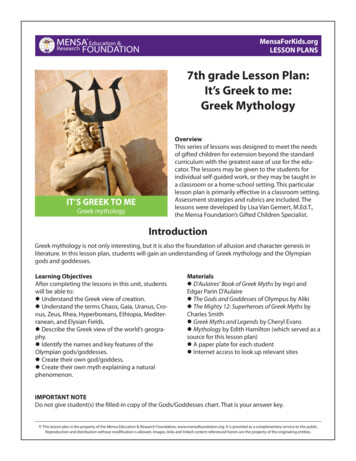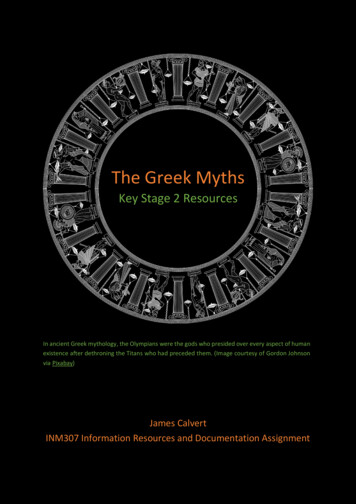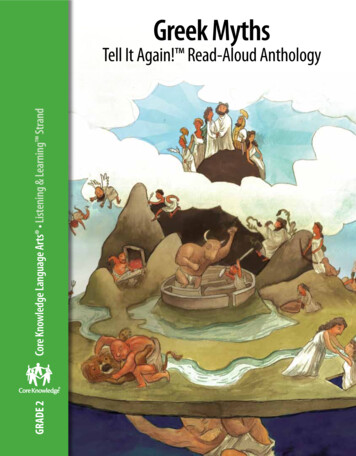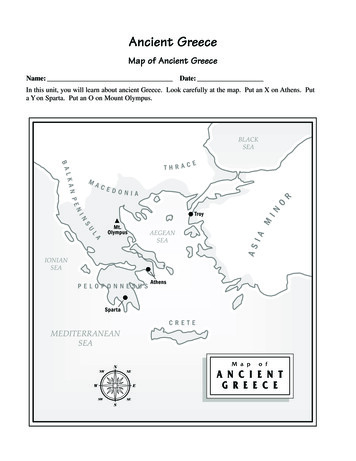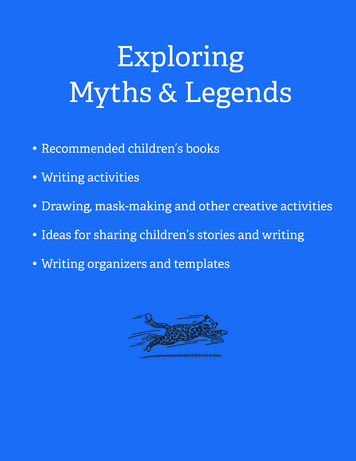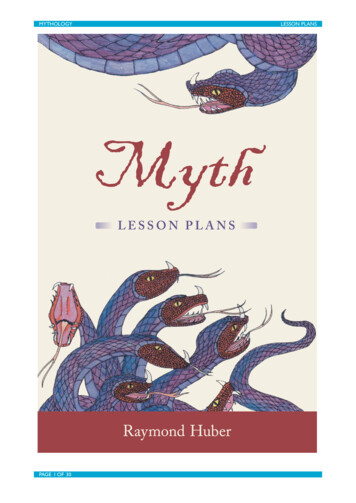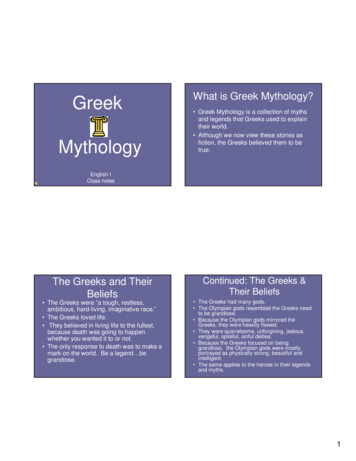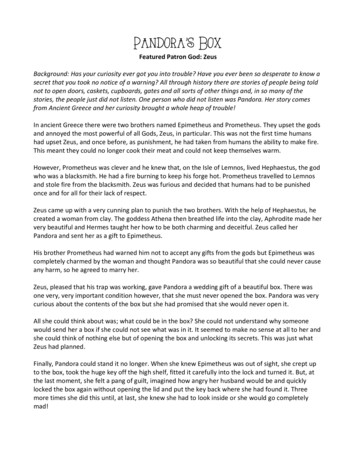
Transcription
Pandora’s BoxFeatured Patron God: ZeusBackground: Has your curiosity ever got you into trouble? Have you ever been so desperate to know asecret that you took no notice of a warning? All through history there are stories of people being toldnot to open doors, caskets, cupboards, gates and all sorts of other things and, in so many of thestories, the people just did not listen. One person who did not listen was Pandora. Her story comesfrom Ancient Greece and her curiosity brought a whole heap of trouble!In ancient Greece there were two brothers named Epimetheus and Prometheus. They upset the godsand annoyed the most powerful of all Gods, Zeus, in particular. This was not the first time humanshad upset Zeus, and once before, as punishment, he had taken from humans the ability to make fire.This meant they could no longer cook their meat and could not keep themselves warm.However, Prometheus was clever and he knew that, on the Isle of Lemnos, lived Hephaestus, the godwho was a blacksmith. He had a fire burning to keep his forge hot. Prometheus travelled to Lemnosand stole fire from the blacksmith. Zeus was furious and decided that humans had to be punishedonce and for all for their lack of respect.Zeus came up with a very cunning plan to punish the two brothers. With the help of Hephaestus, hecreated a woman from clay. The goddess Athena then breathed life into the clay, Aphrodite made hervery beautiful and Hermes taught her how to be both charming and deceitful. Zeus called herPandora and sent her as a gift to Epimetheus.His brother Prometheus had warned him not to accept any gifts from the gods but Epimetheus wascompletely charmed by the woman and thought Pandora was so beautiful that she could never causeany harm, so he agreed to marry her.Zeus, pleased that his trap was working, gave Pandora a wedding gift of a beautiful box. There wasone very, very important condition however, that she must never opened the box. Pandora was verycurious about the contents of the box but she had promised that she would never open it.All she could think about was; what could be in the box? She could not understand why someonewould send her a box if she could not see what was in it. It seemed to make no sense at all to her andshe could think of nothing else but of opening the box and unlocking its secrets. This was just whatZeus had planned.Finally, Pandora could stand it no longer. When she knew Epimetheus was out of sight, she crept upto the box, took the huge key off the high shelf, fitted it carefully into the lock and turned it. But, atthe last moment, she felt a pang of guilt, imagined how angry her husband would be and quicklylocked the box again without opening the lid and put the key back where she had found it. Threemore times she did this until, at last, she knew she had to look inside or she would go completelymad!
She took the key, slid it into the lock and turned it. She took a deep breath, closed her eyes andslowly lifted the lid of the box. She opened her eyes and looked into the box, expecting to see finesilks, gowns or gold bracelets and necklaces or even piles of gold coins.But there was no gleam of gold or treasure. There were no shining bracelets and not one beautifuldress! The look of excitement on her face quickly turned to one of disappointment and then horror.For Zeus had packed the box full of all the terrible evils he could think of. Out of the box poureddisease and poverty. Out came misery, out came death, out came sadness - all shaped like tinybuzzing moths.The creatures stung Pandora over and over again and she slammed the lid shut. Epimetheus ran intothe room to see why she was crying in pain. Pandora could still hear a voice calling to her from thebox, pleading with her to be let out. Epimetheus agreed that nothing inside the box could be worsethan the horrors that had already been released, so they opened the lid once more.All that remained in the box was Hope. It fluttered from the box like a beautiful dragonfly, touchingthe wounds created by the evil creatures, and healing them. Even though Pandora had released painand suffering upon the world, she had also allowed Hope to follow them.
The Competition of Athena and PoseidonFeatured Patron God: PoseidonFeatured Patron Goddess: AthenaBackground: Athena was the goddess of wisdom. She could get angry, but more typically, she was wise,and kind, and understanding. Her father was the mighty Zeus. Zeus loved all his children. But one of hisfavorites was Athena.Poseidon was the brother of Zeus and he ruled over the rivers and seas. He was always represented ascarrying a trident and when struck the sea with this, fierce storms would arise.As the story goes . The Competition, Athena & PoseidonNearly every town in ancient Greece had a god that looked after the townspeople. Towns rarely hadmore than one god to keep an eye on their best interests. Most gods did not share well. So usually, itwas one town and if the town was lucky, one god to watch over it.Poseidon loved watching over towns. He usually picked coastal towns since he was the Lord of theSea. Poseidon was a very powerful god. His brothers were Zeus and Hades. Poseidon was a moodyfellow, but he loved his wife and children and he loved attention. He liked having people buildtemples in his honor and bring him gifts. They were not very useful gifts for a god, but he enjoyedgetting them anyway. As Greece grew and developed, new towns sprang up all the time. Poseidonwas always on the lookout for new coastal towns.He was not the only god who loved to be in charge. Athena, along with other gods, enjoyed that roleas well. One day, both Athena and Poseidon claimed a new village.Most of the time, humans were grateful when they were selected to be under the care of a god. Buttwo gods? That was one too many. Poseidon wanted them to chose which god they wanted. But thepeople did not want to choose. They could see only trouble ahead if they did.Athena, goddess of wisdom, daughter of Zeus, understood their worry. She challenged her unclePoseidon to a contest. Both gods would give the town a gift. The townspeople could decide whichgift was the more useful.Poseidon slapped his specter against the side of the mountain. A stream appeared. The people wereexcited. A source of fresh water was so important! But when they tried to drink the water, theydiscovered it was not fresh at all. It was salt water!Athena waved her arm and an olive tree appeared. The people nibbled at the olives. They weredelicious! The people were excited. The olive tree would provide wood for building homes. Brancheswould provide kindling for kitchen stoves and fireplaces. The olives could be used for food. The fruitcould pressed to release cooking oil. It was wonderful.But theirs was a coastal village. The people could not risk angering the Lord of the Sea, the mightyPoseidon. As it turned out, they did not have to choose. Poseidon chose for them. He laughed hismighty laugh, sending waves crashing against the shoreline. Poseidon proclaimed his niece thewinner! In her honor, they named their village Athens.
King Midas and the Golden TouchFeatured Patron God: DionysusBackground: King Midas is one of the most known and controversial personas in the GreekMythology. King of Phrygia, Midas, was known for his wisdom but also his greed. Althoughone of the most known kings of his time, a fanatic lover of the Arts and Culture, creator of agorgeous rose garden, Midas was known to be extremely greedy, trying to accumulate thelargest amount of money and wealth in the known world.According to the Greek myth, God Dionysus found himself in Phrygia once,followed by a group of Satyrs and other creatures that were always celebratingand feasting with him. Silenus, one of the Satyrs, entered the sacred Rose gardenof Midas and the guards brought the intruder to the King.Midas recognized the follower of Dionysus and decided not to punish him,especially since Silenus decided to stay at the court entertaining Midas withfrantic stories about the pleasures of life. God Dionysus was pleased with Midasand his decision not to punish Silenus, thus asked Midas what he wanted the mostfrom his life – in order to return the favor.Midas said that he wished everything he touched could turn to gold. AlthoughDionysus warned Midas about the potential dangers of such a wish, Midasinsisted on it and Dionysus granted him with the infamous Midas Touch.Midas was thrilled with the gift because he could turn everything to gold, soonthough, he realized that he was unable to eat, drink or do anything normally, sinceeverything he touched would turn to Gold. Midas started understanding thewarnings of Dionysus and the depth of his mistake and greed.Midas went to Dionysus, desperate, and begged him to free him from this “curse”.Dionysus told Midas that he had to go and bathe in the River Paktolos (Pactolus)in order to wash away this ability.Midas indeed went to Paktolos river and washed himself; according to the myththe gold settled in the sand of the river and was carried to another country of theEast, Lydia, that became one of the richest countries of the ancient world.
Helios and Phaethon: The Sun ChariotFeatured Patron God: HeliosBackground: Some people say it was Apollo who brought up the sun each day. Some peopleinsist it was Helios. Still others believe Helios and Apollo were the same god. That's the thingabout myths. It all depends on who is telling the story.As one story goes .Phaethon (Fay-ton) was the son of Helios. Both father and son had curly golden hair andsparkling bright eyes. Both bragged about the other all the time.Helios thought his son was the brightest and bravest kid in the world. He named his son Phaethon(Fay-ton), because Phaethon meant "brilliant" in the ancient Greek language.Phaethon (Fay-ton) was equally proud of his Dad. He thought his Dad had the most importantjob in the world. His Dad's job was to bring out the sun each day. If the sun did not come up, thecrops would die and everyone would starve.Each morning, the Hours, his Dad's servants, would harness four white horses to the mostsplendid golden chariot. It was so splendid that it even had a nickname. The people called it TheSun Chariot.Each morning, without fail, his Dad would leap aboard his golden Sun Chariot and begin hisperilous journey across the sky. (It's not easy to haul a burning sun behind a chariot, even aspecial golden one, without getting burnt yourself.) No matter how tired he was, or how jarred bythe jerking of the chariot, his Dad always managed to reach every corner of the earth, to bringlight and warmth to all the crops and all the people and everything on earth every single day.In the evening, after his Dad had tucked the sun out of sight, to give the sun time to rekindle, hereturned home, weary but content. Each evening, he would gather his beloved son and his equallybeloved wife and daughters, and together they would watch the moon appear in the sky. The nextmorning, without fail, his Dad would leap again aboard his glowing chariot, and fly off to bringout the sun.Phaethon bragged about his father to anyone who would listen, and even sometimes to those whowere not listening at all. He bragged about the golden chariot. He bragged about the four wildhorses. He bragged that one day his father would let him drive the chariot across the sky.Phaethon bragged so much that after a while his friends no longer believed him. They knew hisDad brought up the sun. But they did not believe his Dad would turn over such an important jobto a mere boy, not even for one day. The job was too important to risk.First, his friends began to tease Phaethon. Then, after a while, his friends began to scatter away asPhaethon approached. They were tired of his incessant bragging.Phaethon begged his father to let him drive. He knew he was ready. He knew he could handle thehorses. He knew he could do the job without getting burnt. But mostly, he wanted to prove to hisfriends that his father trusted him enough to give him the reins. Finally, one evening, exhaustedby his son's perpetual pleading, his father said yes.
The next morning, Phaethon eagerly climbed aboard the golden chariot. He took the reins tightlyin his hands. The horses knew at once that the driver was not the capable Helios. They jerked andreared but Phaethon hung tightly to the reins.Phaethon caught the sun up behind him on his first swing by, and began to drag the sun acrossthe sky. Bursting with pride, he dipped down towards the earth. He wanted his friends to see him.But he flew too close. The hot sun began to dry up oceans and rivers and left deserts in their place.When Phaethon realized his mistake, his eyes widened with panic. He yanked the reins to pull thehorses higher in the sky. The horses reared in anger at being jerked so hard. The reins were rippedfrom Phaeton's hands. The runaway chariot tore across the sky, burning a trail behind it, a trailsome call the Milky Way. The horses slowed finally to an amble, and turned towards home, eagerfor oats.High on Mount Olympus, Zeus, the king of all the gods, was sitting outside on his front porch.He had been enjoying his breakfast. But now, he was watching the sky. Something was definitelywrong. It looked like Helios' horses were headed for home, but it was too early for them to gohome. Could Helios have fallen asleep? Zeus hurled a lightning bolt at the chariot as it flew by towake Helios up. It hit the side of the chariot with incredible force. The chariot tilted. Somethingor someone dropped out of the chariot and fell into the Po River.Zeus called for his magical horse, Pegasus. They quickly caught up with the sweating horses, whohad slowed nearly to stop. Pegasus took the lead. Zeus grabbed the reins. Together, Zeus,Pegasus, and the four white horses finished dragging the sun around the earth. By the time theyhad tucked the sun in for the night, Zeus was in a raging temper. Pegasus had been nipped threetimes, which did not help matters any. Zeus roared towards Ethiopia, where Helios kept hispalace.Once Zeus understood that the young boy, Phaethon, had been driving and had probably beenwhat Zeus had noticed dropping out of the chariot into the Po River, Zeus sent Hermes toorganize a search party. It was no use. Phaethon had disappeared. No one knew if he wasdrowned. Perhaps he had made it to shore and was hiding, ashamed. No one ever heard fromhim again.As for Helios and his family, their sadness was great. Some say his daughters cried so much thatZeus, as punishment for Helios' bad judgment, changed his daughters into the poplar trees thatlined the Po River. Some insist it's only the wind, but others say you can still hear them cryingeven today.Helios continued to bring out the sun, but his heart wasn't it. He flew too high and let cloudscover the earth. The earth suffered gloomy day after gloomy day. He flew too low, and burnedrivers down to creeks.Finally, Zeus had to intercede. He made Helios give up his job, the job that had made him soproud, and gave the job of bringing out the sun each day to his own son, Apollo. Some say Zeusgave a golden chariot to Apollo. If he did, it probably was not Helios' chariot. According to oneversion of this ancient myth, Helios gave his splendid chariot to Hades in exchange for a favor that Hades, god of the underworld, would keep an eye out for his young son, Phaethon.
The Magical RocksFeatured Patron God: AresBackground: Ares was the god of war. He was true royalty as far as the gods wereconcerned. His parents were the king and queen of the ancient Greek god world. Hisfather was Zeus and his mother was Hera. Ares was tall. He was handsome. He wasmean. He was self-centered. Nobody liked him much.Ares best friend was Eris, the spirit of disagreement. The two often traveled together,and they often brought the spirits of Pain, Panic, and Famine (starvation, pronounced:fam-in) with them. When the ancient Greeks went to war, Ares often got involved. Hedid not care who won or lost a battle. He just liked bloodshed. His best friend, thespirit Eris, did not care that much about bloodshed, but she loved to causedisagreement - the angrier, the better. The pair of them were nothing but trouble.As the story goes . Once upon a time, a long time ago, Ares, the Greek god ofwar, was fighting against the Greeks in a field in the northernmost tip of ancientGreece. The field was on the border of Macedonia (mass-uh-dohn-ia), a country tothe north. The Macedonians (mass-uh-dohn-ians) were forever crossing the line,trying to conquer the Greek city-states, one at a time. Ares kept a close eye on thatfield as a many a battle had been fought there. Ares did not wish to miss a goodbattle. Athena, goddess of wisdom, saw her half-brother, screaming and shoutinghappily, as the Greeks died around him. Athena believed the Greeks cause was just,as they were simply defending their home. She picked up a rock and threw it ashard as she could at Ares. Ares wasn't paying attention as usual. He was busyenjoying the bloodshed. The rock knocked him out cold. When he woke up, thebattle was over. The Greeks had won! Ares never knew it was his sister, Athena,who had knocked him out of the battle!After that, nobody knows how but somehow, a rumor started that the great god Areshad been attacked by a magical rock! Nobody listened to the rumor, nobody that isexcept two young brothers. The brothers owned the field where battles kepthappening. It was very hard to grow crops while men were fighting. The boys hadgrown into giants! Well, not giants perhaps, but certainly tall and manly and strong.The boys quietly collected a huge stack of heavy rocks, hoping one of them would bea magical rock. Their neighbors thought they were building a wall to help protecttheir field from the Macedonians. But actually, they were waiting for Ares. Theyknew Ares would show up sooner or later, because Ares loved bloodshed, and manya battle had been fought in their field. Ares was bound to keep checking. Sureenough, one day, they spotted the great god Ares in their field! They threw rocks athim. They were very fortunate that one of their rocks hit Ares and knocked him out
cold before Ares noticed what they were doing. The boys quickly stuffed Ares into ahuge vase and plugged the top securely.Ares was stuck in that vase for a very long time. And for a very long time, thebrothers lived a peaceful life. No battles were fought. Their crops flourished. Theirneighbors to the north became their friends. Ares might still be in that vase today ifone of the brothers had not bragged to a neighbor about what they had done. Thegod Hermes heard about it. (Sooner or later, Hermes heard abouteverything.) Hermes rescued his brother, not that Ares said thank you. But Aresnever came back to that field, thinking perhaps that the tale of magical rocks wastrue! Besides, there were many other fields in ancient Greece, and many otherbattles. As long as there was bloodshed to enjoy somewhere, Ares was happy.
Zeus, Hera, and Little IoFeatured Patron Goddess: HeraOnce upon a time, a long time ago .Zeus, Poseidon, and Hades were the three sons of Kronos. Zeus ruled the sky, Poseidon ruled the sea,and Hades ruled under the earth, the home of the dead. At first, it was great fun. But things had beenjust a bit slow lately. Zeus thought about what he could do.He could turn himself into an octopus and visit his brother Poseidon under the sea, but he didn't feelmuch like a swim.He could visit Hades under the earth, but Hades was such a gloomy fellow.He could hurl thunderbolts, but it wasn't much fun without a target.He could hunt up one of the other gods. But the truth was, all the other gods were terrified of Zeus. Hedid have a terrible temper, but only when someone lied to him. Since the gods often lied, they mostlyavoided Zeus.He could call for his wife, Hera. But the truth was, Zeus was a little frightened of his wife, Hera.He could find a beautiful woman. But he couldn't let Hera catch him. His wife Hera was very veryjealous.Zeus flew down to earth and looked around for something to do. He spotted two men walking along alane. Zeus cast his voice to make it sound like somebody else was speaking. He was very good at that."Hey stupid," Zeus cast his voice loudly, hoping to start a fight.One man turned to the other angrily. "What did you say?" And before you could say Zeus, fists wereflying. Zeus found that very funny.A glint on the river caught his eye. It was Io, a lovely river nymph."What a lovely young woman," Zeus said. He promptly fell in love.Hoping to hide himself from the eagle eye of his jealous wife, Zeus covered the world with some reallythick clouds. Then he flew down to Io. But Hera was not stupid. The thick coat of clouds made hersuspicious immediately.Zeus looked up. "It's Hera!" he gulped.Quickly, Zeus changed Io into a cow. When Hera landed, all she found was an innocent looking Zeusstanding next to a little white cow."This little cow appeared out of nowhere," he told his wife, acting surprised.Hera was not fooled. "What a beautiful cow," she gushed admiringly. "May I have it as a present?"
Not knowing what else to do, Zeus had to agree. Hera sent the cow away under guard.Zeus arranged for Io to be rescued and set free. He sent his son Apollo to sing the guard asleep. Whenthe guard closed his eyes, Io ran away.When Hera heard about it, she sent a gadfly after Io. A gadfly is a fly that bites. Io screamed, when thegadfly found her. Io swam across a sea, hoping the gadfly would drown on the trip. No such luck,although Hera did name the sea between Greece and Rome after Io. Perhaps you've heard of it - theIonian Sea?Feeling very sorry for herself, a dispirited Io traveled next to Egypt. It was then that Hera decided that Iohad suffered enough. First, she made Zeus promise that he would never see Io again. Then she changedIo back into human form, and left her in Egypt. Egypt was a dismal place for a river nymph. There arecrocodiles in the Nile.
The Story of Medusa and AthenaOnce upon a time, a long time ago there lived a beautiful maiden named Medusa. Medusalived in the city of Athens in a country named Greece -- and although there were manypretty girls in the city, Medusa was considered the most lovely.Unfortunately, Medusa was very proud of her beauty and thought or spoke of littleelse. Each day she boasted of how pretty she was and each day her boasts became moreoutrageous.On Sunday, Medusa bragged to the miller that her skin was more beautiful than fresh fallensnow. On Monday, she told the cobbler that her hair glowed brighter than the sun. OnTuesday, she commented to the blacksmith’s son that her eyes were greener than theAegean Sea. On Wednesday, she boasted to everyone at the public gardens that her lipswere redder than the reddest rose.When she wasn’t busy sharing her thoughts about her beauty with all who passed by,Medusa would gaze lovingly at her reflection in the mirror. She admired herself in herhand mirror for an hour each morning as she brushed her hair. She admired herself in herdarkened window for an hour each evening as she got ready for bed. She even stopped toadmire herself in the well each afternoon as she drew water for her father's horses -- oftenforgetting to fetch the water in her distraction.On and on Medusa went about her beauty to anyone and everyone who stopped longenough to hear her -- until one day when she made her first visit to the Parthenon with herfriends. The Parthenon was the largest temple to the goddess Athena in all the land. It wasdecorated with amazing sculptures and paintings. Everyone who entered was awed by thebeauty of the place and couldn’t help but think of how grateful they were to Athena,goddess of wisdom, for inspiring them and for watching over their city ofAthens. Everyone, that is, except Medusa.When Medusa saw the sculptures, she whispered that she would have made a much bettersubject for the sculptor than Athena had. When Medusa saw the artwork, she commentedthat the artist had done a fine job considering the goddess's thick eyebrows -- but imaginehow much more wonderful the painting would be if it was of someone as delicate asMedusa.And when Medusa reached the altar she sighed happily and said, “My this is a beautifultemple. It is a shame it was wasted on Athena for I am so much prettier than she is –perhaps some day people will build an even grander temple to my beauty.”Medusa’s friends grew pale. The priestesses who overheard Medusa gasped. Whispers ranthrough all the people in the temple who quickly began to leave -- for everyone knew that
Athena enjoyed watching over the people of Athens and feared what might happen if thegoddess had overheard Medusa’s rash remarks.Before long the temple was empty of everyone except Medusa, who was so busy gazingproudly at her reflection in the large bronze doors that she hadn't noticed the swiftdeparture of everyone else. The image she was gazing at wavered and suddenly, instead ofher own features, it was the face of Athena that Medusa saw reflected back at her.“Vain and foolish girl,” Athena said angrily, “You think you are prettier than I am! I doubtit to be true, but even if it were -- there is more to life than beauty alone. While otherswork and play and learn, you do little but boast and admire yourself.”Medusa tried to point out that her beauty was an inspiration to those around her and that shemade their lives better by simply looking so lovely, but Athena silenced her with afrustrated wave.“Nonsense,” Athena retorted, “Beauty fades swiftly in all mortals. It does not comfort thesick, teach the unskilled or feed the hungry. And by my powers, your loveliness shall bestripped away completely. Your fate shall serve as a reminder to others to control theirpride.”And with those words Medusa’s face changed to that of a hideous monster. Her hairtwisted and thickened into horrible snakes that hissed and fought each other atop her head.“Medusa, for your pride this has been done. Your face is now so terrible to behold that themere sight of it will turn a man to stone,” proclaimed the goddess, “Even you, Medusa,should you seek your reflection, shall turn to rock the instant you see your face.”And with that, Athena sent Medusa with her hair of snakes to live with the blind monsters - the gorgon sisters -- at the ends of the earth, so that no innocents would be accidentallyturned to stone at the sight of her.
The Reason for Seasons - Demeter & PersephoneZeus, the king of all the gods, had two brothers and three sisters. Each had an important job. His sister,Demeter, was in charge of the harvest. If Demeter did not do her job, the crops could die, and everyonewould starve. It was important to keep Demeter happy. Everyone helped out with that - both gods andmortals. It was that important.As the story goes .Demeter loved her little daughter, Persephone. They played together in the fields almost every day. AsPersephone smiled up at her mother, Demeter's heart swelled with happiness, and the crops grew highand healthy. Flowers tumbled everywhere. As time passed, Persephone grew into a lovely goddess.That's when the trouble started.Hades, the king of the underworld, was a gloomy fellow. He normally hung out in the Underworld.One day, Hades felt restless. He decided to take his three-headed dog out for a chariot ride. Cerberus,his dog, usually stood guard at the gate to Underworld. But Hades gave his pup a break now and then.He scooped up Cerberus, and left a couple of spirits in charge instead.Hades flew his chariot up to earth. Cerberus leaped out of the chariot and ran around, sniffing flowerswith all three of his heads. The dog ran up to a lovely young woman, the goddess Persephone. Somepeople might have been startled if a three-headed dog came tearing up. But Persephone only laughedand scratched his heads.Hades loved that old dog. He watched his dog playing happily with Persephone. He heard Persephone'sdelighted laugh. Hades fell deeply in love. Before anyone could stop him, he grabbed his niece, hisdog, and his chariot and dove deep into the darkest depths of the Underworld.Hades locked Persephone in a beautifully decorated room in the Hall of Hades. He brought her allkinds of delicious food. Persephone refused to eat. She had heard if you ate anything in Hades, youcould never leave. She had every intention of leaving as soon as she could figure out how to do so.Over a week went by. Finally, in desperate hunger, Persephone ate six pomegranate seeds. Shepromptly burst into tears.She was not the only one crying. Demeter, her mother, missed her daughter terribly. She did not care ifthe crops died. She did not care about anything except finding her daughter. No one knows who toldZeus about it, but it was clear this could not go on. Zeus sent his son Hermes to work a deal withHades.This was the deal Hermes worked out: If Persephone would marry Hades, she would live as queen ofthe Underworld for six months each winter. In the spring, Persephone would return to earth and livethere for six months. No one especially liked the deal, but everyone finally agreed.Every spring, Demeter makes sure flowers are blooming and crops are growing and the fields are greenwith welcome. Every fall, when Persephone returns to the underworld, Demeter ignores the crops andflowers and lets them die. Each spring, Demeter brings everything to life again, ready to welcome herdaughter's return. To the ancient Greeks, that was the reason for seasons - winter, spring, summer, fall.
THE MYTH OF HERACLES (Hercules)Heracles (Heir-uh-cleez) was the greatest of the mythological Greek heroes. He was famous for his incrediblestrength, courage, and intelligence. Hercules is his Roman name. The Greeks called him Heracles (Heir-uhcleez).Birth of HeraclesHeracles was a demigod. This means that he was half god, half human. His father was Zeus, k
more than one god to keep an eye on their best interests. Most gods did not share well. So usually, it was one town and if the town was lucky, one god to watch over it. Poseidon loved watching over towns. He usually picked coastal towns since he was the Lord of the Sea. Poseidon was a very powerful god
